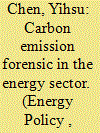|
|
|
Sort Order |
|
|
|
Items / Page
|
|
|
|
|
|
|
| Srl | Item |
| 1 |
ID:
166386


|
|
|
|
|
| Summary/Abstract |
Climate policy has mostly focused on regulating power suppliers. There is a growing interest in exploring regulating emissions from the demand side by incentivizing consumers to reduce their energy consumptions, or to purchase power from cleaner sources through tracking carbon content of power flow in the transmission network. This paper analyzes market outcomes under two approaches: producer-based and demand-based carbon taxes. We formulate each approach as a market equilibrium model. For the consumer-based approach, the analysis assumes that a utility, procuring electricity on behalf of consumers, is subject to the carbon tax. For the producer-based approach, the producers are subject to the carbon tax, and therefore, pay for their emissions. We show that the two approaches are equivalent when the program's coverage is complete. However, when the coverage is incomplete, the consumer-based carbon tax is less effective in pricing carbon emissions owing to the fact that sales to unregulated regions are not subject to the carbon tax. Given that the transaction cost of implementing consumer-based tax is likely to be high, benefit of tracking power flows in order to estimate carbon content or footprint might not be justified even with a full coverage program.
|
|
|
|
|
|
|
|
|
|
|
|
|
|
|
|
| 2 |
ID:
126838


|
|
|
|
|
| Publication |
2014.
|
| Summary/Abstract |
This paper examines the implications of alternative forms of cap-and-trade regulations on the California electricity market. Specific focus is given to the implementation of a downstream form of regulation known as the first-deliverer policy. Under this policy, importers (i.e., first-deliverers) of electricity into California are responsible for the emissions associated with the power plants from which the power originated, even if those plants are physically located outside of California. We find that, absent strict non-economic barriers to changing import patterns, such policies are extremely vulnerable to reshuffling of import resources. The net impact implies that the first-deliverer policies will be only marginally more effective than a conventional source-based regulation.
|
|
|
|
|
|
|
|
|
|
|
|
|
|
|
|
| 3 |
ID:
105816


|
|
|
|
|
| Publication |
2011.
|
| Summary/Abstract |
Emission trading programs (C&T) and renewable portfolio standards (RPS) are two common tools used by policymakers to control GHG emissions in the energy and other energy-intensive sectors. Little is known, however, as to the policy implications resulting from these concurrent regulations, especially given that their underlying policy goals and regulatory schemes are distinct. This paper applies both an analytical model and a computational model to examine the short-run implications of market interactions and policy redundancy. The analytical model is used to generate contestable hypotheses, while the numerical model is applied to consider more realistic market conditions. We have two central findings. First, lowering the CO2 C&T cap might penalize renewable units, and increasing the RPS level could sometimes benefit coal and oil and make natural gas units worse off. Second, making one policy more stringent would weaken the market incentive, which the other policy relies upon to attain its intended policy target.
|
|
|
|
|
|
|
|
|
|
|
|
|
|
|
|
|
|
|
|
|